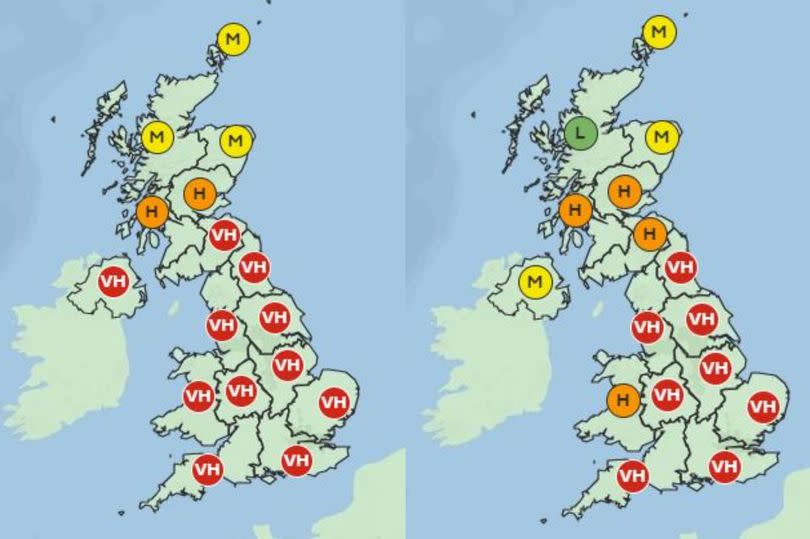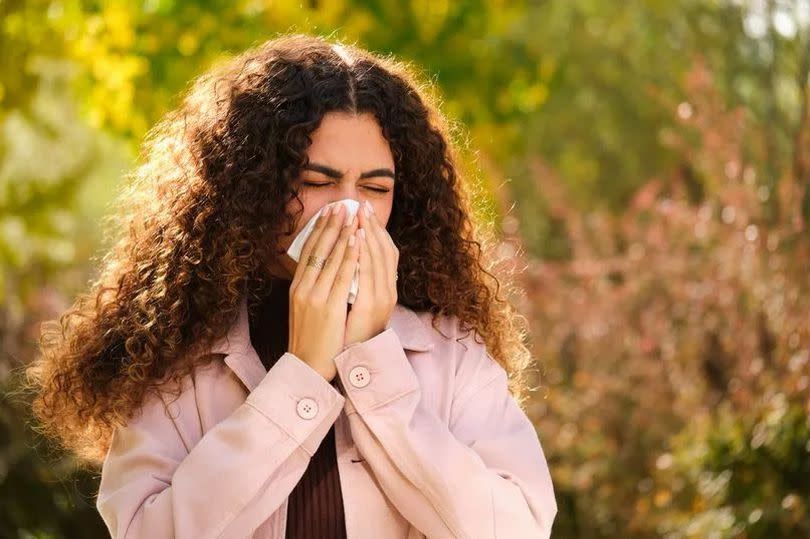GP's tips for surviving hay fever as Met Office warns of high pollen count this week

Hay fever sufferers are being warned as the pollen count shoots up to its highest level in parts of the UK this week. It comes as temperatures stretch to the low 20s across the country, including in the North West.
Greater Manchester will see highs of 20C between Wednesday and Friday, according to the Met Office. The mercury dips to a maximum of 18C on Saturday, climbing to 20C and then 22C on Sunday and Monday respectively.
The pollen count is set to rise to 'very high' for three consecutive days, between Wednesday and Friday, for much of the UK this week, according to the Met Office's most recent weather maps. The north west's pollen count increases from high to very high on Wednesday, with the rest of England except for the North East also seeing very high levels. Wales and Northern Ireland are forecast the same, while south Scotland will see high levels and north Scotland medium.
READ MORE: Man's trip to the chippy ends with him in jail for decades
The North West's pollen count remains very high on Thursday. The North East and parts of southern Scotland also jump from high to very high. Meanwhile Friday sees the pollen warnings relax in Northern Ireland, southern Scotland and Wales. However the whole of England will once again see 'very high' pollen counts.
Saturday's forecast predicts a dip to 'high' levels of pollen in the North West. Wales, Northern Ireland, South West England, London and the South East as well as Strathclyde in Scotland will see the same. Southern Scotland, North East England, Yorkshire and the Humber, the East and West Midlands and East England are predicted 'very high' levels.

The Met Office said about the pollen in the North West: "Grass pollen will rise in warm, dry weather. Nettle, dock & plantain too. Spores: A little Alternaria & medium Cladosporium when warm; Leptosphaeria after rain."
A GP previously revealed some top tips on how to survive a 'pollen bomb' when you suffer with hay fever. The allergy causes unpleasant symptoms including sneezing, coughing, itchy eyes and a sore throat. You're more likely to have it or develop it if you already have conditions including asthma and eczema.
Dr Roger Henderson, 63, a GP of 35 years, advised taking antihistamines ahead of the pollen count rising, not just when you start to get symptoms. He also recommends keeping pollen exposure to a minimum.
The GP, from Whitehaven, Cumbria, said: "What a pollen bomb will do is trigger people with mild hay fever. This means they get symptoms they don't normally get because of the intense exposure. One of the ways of avoiding hay fever is staying inside when the pollen is high.
"You should stay away from areas like parks or areas that have more pollen. Especially early morning and late afternoon/evening - when pollen count is highest."

But sometimes staying inside during peak times of the day can't be avoided. Dr Roger, who represents decongestant brand Olbas, said if you've been outdoors during a pollen bomb, you should wash your clothes before next wearing them. And if you're struggling to sleep at night, it could be that your sheets need a wash too to get the pollen off too.
But he added a mistake lots of people make is then going to dry your clothes and sheets outside - allowing them to become covered in pollen again. And similarly to your clothes, he said if you've been outside you should wash your hair to remove any lingering pollen.
When in the home, make sure to dust surfaces regularly so pollen can't settle - and use a wet cloth. He said: "If you’re going to clean your house, dust with a damp cloth rather than a dry cloth, because a damp cloth helps mop up pollen.
"Using a dry cloth, you can get clouds of dust and pollen which makes it worse. Anything that can trap dust can trap pollen - even dried flowers and curtains - so vacuum or wipe with a wet cloth."
This can also refer to soft furnishings and things like teddy bears - which can secretly harbour pollen and worsen symptoms indoors. In severe cases, he even recommends locking them in a different room.
Dr Roger said: "Things like stuffed animals, you can't dust them but you can dampen them. You should do it with a wet cloth to help with the trapped pollen. If it's really bad with your stuffed animals, quarantine them in a separate room until you feel better."
When it comes to itchy eyes, he reckons everyone should invest in a pair of wraparound sunglasses, as they keep pollen out much better than regular frames do.

 Yahoo News
Yahoo News 
